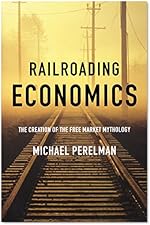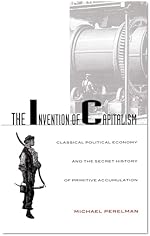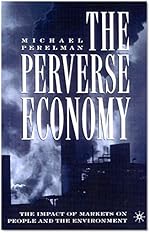Archive for February, 2010|Monthly archive page
Clean Coal?
A company now plans to run nuclear power plants off the radioactive residue of coal ash.
Winning, David. 2009. “Out of the Ashes: A Small Mining Company Has Big Plans to Sell the Uranium Left Over When Coal Is Burned.” Wall Street Journal (22 February): Journal Report.
“Sparton Resources Inc., a small Toronto mining company, is betting that a global renaissance in nuclear power will create a market for an unlikely fuel source: waste coal ash. Natural coal contains trace amounts of uranium, and when it is burned to produce electricity, varying amounts of the radioactive element are left behind in the ash. Sparton has developed a method for recovering it and says a project under way at a coal-fired power station in southwestern China is yielding uranium that could be reused as a fuel for nuclear reactors.”
The Ironies of Imperialism: Haiti vs. India
I first criticized the Green Revolution in
Perelman, Michael. 1971. “Second Thoughts on the Green Revolution.” The New Republic, v. 165 (17 July): pp. 21-22; and then in a book, Farming for Profit in a Hungry World.
The Green Revolution was designed to promote capitalist development by changing class relationships in the countryside, making developing countries more dependent on imported inputs, while leaving the system susceptible to the environmental problems associated with intensive chemical agriculture.
The Wall Street Journal published an article describing the falling yields in India from the over-application of nitrogen fertilizer. A second article describes the heroic efforts of an agricultural operation funded in part by the wonderful Paul Farmer.
The articles offer a fascinating window into the contradictions of capitalist development, the unexplained damage done to Haiti by imperialism — they do so without ever connecting the dots, but that is easy to do.
Anand, Geeta. 2010. “Green Revolution in India Wilts as Subsidies Backfire.” Wall Street Journal (23 February): p. A 1.
http://online.wsj.com/article/SB20001424052748703615904575052921612723844.html#mod=todays_us_page_one
“In the 1970s, India dramatically increased food production, finally allowing this giant country to feed itself. But government efforts to continue that miracle by encouraging farmers to use fertilizers have backfired, forcing the country to expand its reliance on imported food.”
“India has been providing farmers with heavily subsidized fertilizer for more than three decades. The overuse of one type — urea — is so degrading the soil that yields on some crops are falling and import levels are rising. So are food prices, which jumped 19% last year. The country now produces less rice per hectare than its far poorer neighbors: Pakistan, Sri Lanka and Bangladesh.” Continue reading
Sex, Lies, and Economics: The Amazing Story of Economics and Economists Before Adam Smith
I am getting ready to send out my proposal for my new book. If anyone has any comments on this, I would be most appreciative.
 Comments (4)
Comments (4)
 25 – The Confiscation of American Prosperity: From Right-Wing Extremism and Economic Ideology to the Next Great Depression
25 – The Confiscation of American Prosperity: From Right-Wing Extremism and Economic Ideology to the Next Great Depression 30 – Manufacturing Discontent: The Trap of Individualism in Corporate Society
30 – Manufacturing Discontent: The Trap of Individualism in Corporate Society Class Warfare in the Information Age
Class Warfare in the Information Age Railroading Economics: The Creation of the Free Market Mythology
Railroading Economics: The Creation of the Free Market Mythology Steal This Idea: Intellectual Property Rights and the Corporate Confiscation of Creativity
Steal This Idea: Intellectual Property Rights and the Corporate Confiscation of Creativity The Invention of Capitalism: Classical Political Economy and the Secret History of Primitive Accumulation
The Invention of Capitalism: Classical Political Economy and the Secret History of Primitive Accumulation The Perverse Economy: The Impact of Markets on People and the Environment
The Perverse Economy: The Impact of Markets on People and the Environment